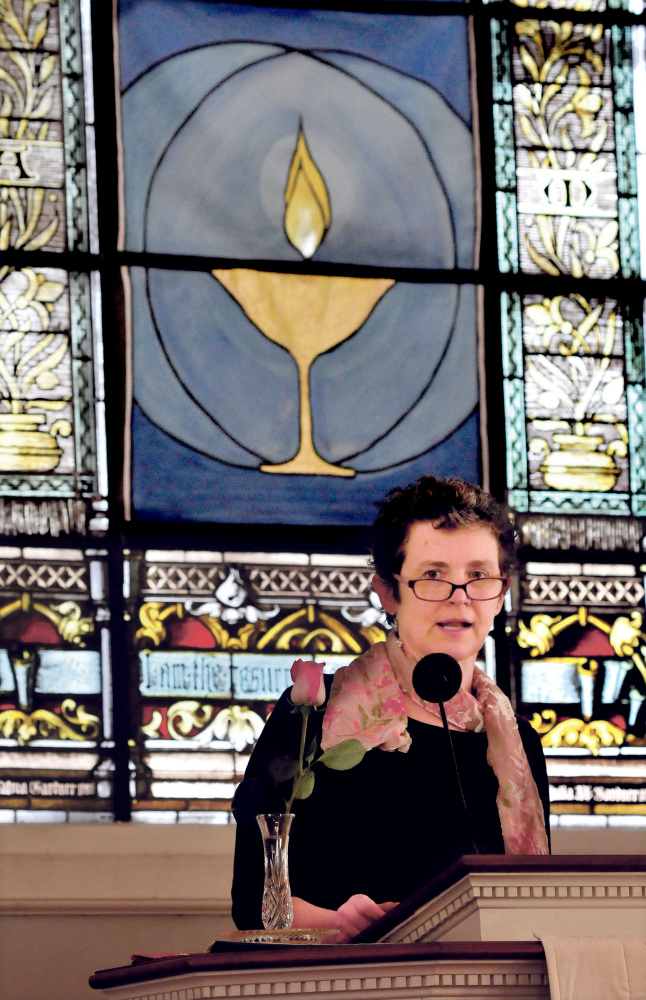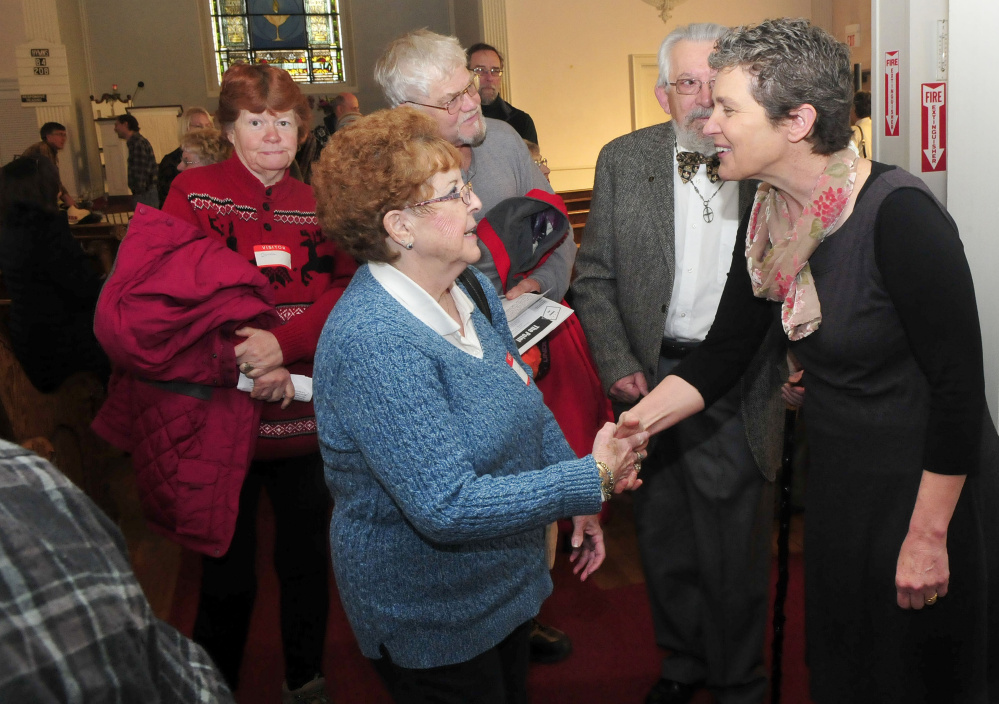WATERVILLE — In front of a crowded house at the Universalist-Unitarian Church on Silver Street, nationally recognized author Kate Braestrup spoke about rights, civility and understanding. And she began so with a story.
Braestrup, who is also a game warden and a chaplain at the Maine Warden Service, told the story of Fiorello La Guardia, who was mayor of New York City during the Great Depression. Braestrup said that one night, La Guardia went to a courthouse where poor people were more typically tried. La Guardia was allowed to act as judge that night, and the first case that came before him was of a grocer suing a woman who stole a loaf of bread for her starving family. The grocer would not drop the charges because he wanted to send a message to the rest of the neighborhood about stealing. Rather than let her go to jail, La Guardia paid the woman’s fine and also charged everyone in the room 50 cents for allowing a city to permit such poverty.
At face value, she said the shopkeeper was clearly the bad guy for wanting to punish a poor person. But Braestrup said there was little choice for the shopkeeper. Was he supposed to just let her steal the loaf, and what about more food in the future? And then if he just gave her food, shouldn’t he then have to let the rest of the neighborhood have free food?
“Is the whole burden of her support to be borne by the shopkeeper?” she asked before asking how long it would be before that shopkeeper went out of business.
The story exposed the often complicated “language of rights,” she said.
Braestrup spoke about a project she’d been working on called her “year of thinking dangerously.” Identifying herself politically as a liberal Democrat, she said the idea behind the project was to seek out people with much different political ideologies and “engage in meaningful conversation.” She said it was made easy because she works with law enforcement, whose members tend to be more conservative, she said.
“I knew in my bones that conservatives were not necessarily jerks,” she said, but instead they are “incredibly kind and caring people.”
During these conversations, she said she learned more about the rights of American citizens. She said when the same rights are awarded to some citizens and not others, it ceases being a right and is reduced to a privilege. She used an example of freedom of speech and putting up signs in your own yard: A person and a neighbor both have the right to put a sign in their yard with messages, but it would not be fair for the government to take one sign down and allow the other to stand.
“Rights are not a zero-sum game,” she said.
She said that in talking to people with different ideologies, engaging in an actual conversation is a sign of compassion and offers others rights not always afforded: mutual understanding, interest and respect.
“Talking to people we don’t agree with may be the best contribution to the great American experiment,” she said.
In an age in which the current presidential administration is proposing banning immigrants from getting into the country and planning to build a physical wall along the border between the United States and Mexico, many in the audience took Braestrup’s message to heart.
Rosemary Winslow was sitting toward the back of the church at the Sunday service. She said she had heard Braestrup speak before and got to know her a little when Winslow was working for then U.S. Rep. Mike Michaud. She said Braestrup came to Washington, D.C., and addressed the House of Representatives, which she said was a good experience. Winslow said she needed to hear the sermon because of all the bad news surrounding the country in recent weeks. She said the news about a ban on immigrants is tough to listen to. “I needed to take a break and be somewhere calming,” she said.
George Stanley said he has studied Braestrup’s work before, and it had been on his “bucket list” to see her speak in person. He said she had “beautiful ideas,” and the notion of engaging in meaningful conversations with someone on the other side of the political spectrum resonated with him.
“It’s hard to catch someone of her stature,” he said in the church’s basement community room after the service.
Stanley, a Greene resident, said while getting his oil changed not long ago, he met a person who supported Donald Trump’s ultimately successful campaign for the White House. Stanley said they had a civil and cordial discussion. He said they agreed to meet again in four years over an oil change to discuss how the country had fared.
“I’m on the side of change and the side of love,” he said.
Coreine Fletcher, of Palmyra, said she thought Braestrup’s sermon was “fantastic.” She said while there is good and bad in every country, she didn’t think it was acceptable to place a ban on immigrants coming into the country.
Colin Ellis — 861-9253
cellis@centralmaine.com
Twitter: @colinoellis
Send questions/comments to the editors.





Comments are no longer available on this story